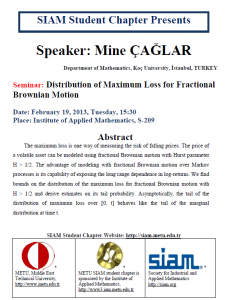- Present your research during Euro-Informs 26th European Conference on Operational Research in Rome, Italy. It is a conference which has participants from whole of the world. It is not just an international conference, it is joint international conference.
- Represent SIAM (Society for Industrial and Applied Mathematics) & METU in a joint international conference.
- The fields of researches are sprawled. We invite all students, researchers interested in any branch of Operational Research, Mathematical modeling or economic analysis to participate at the conference and to present their research. All research in engineering, sciences, economics, management and other fields that uses applied math is welcome.
- Present your research as an abstract at most 1 page or as a paper at most 6 pages.
- A support of $1000 will be available for the student that will be selected.
If you satisfy the eligibility requirements indicated below please submit your manuscript to metusiam@gmail.com by February 22nd, 2013, Friday, Midnight.
- Any PhD, Masters, or senior undergraduate student may apply. The student has to be a member of the SIAM Student Chapter (any METU student can become a member by contacting the Chapter at metusiam@gmail.com).
- If the work to be presented is based on the Masters or PhD thesis of the student, the defense date of the thesis must be after January 1, 2012. If the work to be presented is based on a paper, the first submission date of the paper to any journal must be after January 1, 2012
Websites related to the event
METU SIAM Student Chapter: http://siam.metu.edu.tr
SIAM Global website: http://siam.org
European Conference on Operational Research: http://euro2013.org/
METU SIAM Student Chapter is sponsored by the Institute of Applied Mathematics and the Department of Mathematics. Institute website: http://iam.metu.edu.tr/ (old website http://www3.iam.metu.edu.tr)






